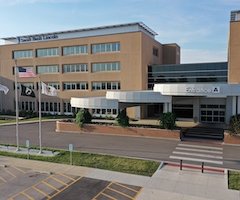As health systems continue to treat high volumes of COVID-19 patients, the search to bring relief to infected people is on-going. Luckily, some effective medications have been produced.
In November 2020, the U.S. Food and Drug Administration issued an emergency use authorization for the monoclonal antibody treatment for people with mild to moderate symptoms and are at a high-risk of developing more severe symptoms from COVID-19. Some factors that lead to high-risk include being more than 65 years old, obesity, pregnancy, and hypertension, but many other factors would qualify a person for this treatment. The American College of Obstetricians and Gynecologists recommends that obstetric care clinicians consider giving pregnant women the monoclonal antibody treatment, since COVID-19 worsens pregnancy complication risk and chance of hospitalization.
“If you’re on a medication, you’re probably high-risk. The monoclonal antibodies are underutilized, and the people who we have given it to feel much better afterward,” Diane Dow, RN, Patient Care Specialist, stated.
Exposure to someone with COVID-19 can also qualify them to receive the monoclonal antibodies; however, it’s only recommended if they are unvaccinated. Most people in this case are living together, and it’s nearly certain the other person will contract COVID-19 themselves. Even asymptomatic, high-risk people are encouraged to get this treatment since there is a good chance that symptoms can arise later. People must be 12 years or older and weigh more than 88 lbs for this treatment.
Monoclonal antibodies are laboratory-made proteins that mimic the immune system’s ability to fight off viruses such as COVID-19. The spike protein in COVID-19 is used to get the virus into your cells. The monoclonal antibodies target and block the spike protein in COVID-19 and thus, block entry into human cells and replicating.
“I think a lot of people plan to wait until the illness worsens, but the earlier you get it, the better people will fair. Most symptoms don’t progress after getting the infusion,” Matt Clifton, R. Ph., Pharmacy director, explained.
Sarah Bush Lincoln administers the antibodies to people through a 20 minute to hour-long IV infusion, depending on the brand that is prescribed. In order to reduce the chance of spreading the virus, people are escorted from their car to Special Procedures, where they will receive the infusion and stay for a total of two to 2.5 hours for the treatment and observation period.
The monoclonal antibodies are 70 percent effective at preventing hospitalizations, and people often feel better within a day or two. However, people should not receive the monoclonal antibodies beyond 10 days of symptoms, if they have an increased oxygen requirement, or are currently being hospitalized.
Clifton explained, “No patients that Sarah Bush Lincoln has treated have indicated any adverse reactions that they didn’t already have, such as a fever or chilling. With any early use medications, there is hesitancy, but the drug has emergency authorization and can really help prevent people from being hospitalized.”
The medication is free, and nearly all insurances cover the cost of infusion. Patients will not see a bill for the treatment. SBL has administered the monoclonal antibodies to more than 400 patients. While the monoclonal antibodies do help protect people from worse COVID-19 symptoms, Clifton emphasized that it does not replace the vaccine that provides stronger, longer-lasting protection.
“We’ve never had patients come to the hospital asking for a drug like they have with this one. The word of mouth has increased interest because it’s really helping sick patients recover,” Dow said.
For more information about whether the COVID-19 monoclonal antibody treatment is right for you, please contact your primary care provider.

